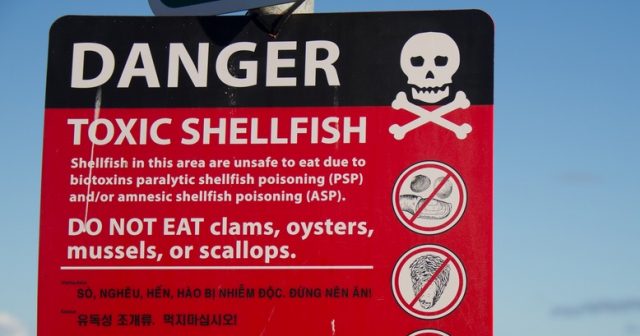High heat, low tide likely triggering spike in shellfish-linked infections

From Washington State Department of Health:
OLYMPIA — An outbreak of vibriosis in Washington has already surpassed the highest number of cases ever recorded by the state for the month of July. Recent high temperatures and low tides in Washington State are likely to blame for the increased rate of illness, which is associated with eating raw or undercooked shellfish, especially oysters that are contaminated with Vibrio.
Found naturally in the environment, Vibrio bacteria thrive in warm temperatures. When midday low tides coincide with warm weather, Vibrio bacteria can grow quickly, increasing risk of illness among people who eat raw or undercooked oysters.
Vibriosis symptoms include diarrhea, abdominal cramps, nausea, vomiting, headache, fever, and chills. The illness usually occurs 4 hours to 4 days after eating contaminated shellfish, with mild or moderate symptoms that typically run its course in 2 to 3 days. Most people get sick within one day of consuming raw or undercooked shellfish.
People with weakened immune systems or liver disease are at higher risk for Vibrio infections. These people, and anyone who wants to avoid illness, should eat only thoroughly cooked shellfish.
“Another effect of the recent heat wave is the perfect storm of conditions for Vibrio infections. It’s important that when enjoying shellfish, we follow simple steps to stay healthy,” said Todd Phillips, Director of the Office of Environmental Health and Safety.
The Three Cs can prevent illness from Vibrio.
- Cook at 145° F for 15 seconds to destroy Vibrio bacteria.
- Check the DOH Shellfish Safety Map before heading to the beach to harvest shellfish recreationally. Shellfish gathered from open and approved areas should be harvested as the tide goes out.
- Chill quickly. Bring a cooler with ice with you when harvesting shellfish recreationally or purchasing for a store or seafood stand (or have them packed on ice). Oysters should be put on ice or refrigerated as soon as possible.
When preparing shellfish, people should wash hands frequently and not return cooked shellfish to the plate or cutting board where raw shellfish was prepared.
Visit the DOH Vibriosis web page for more information.
You Might Also Like



